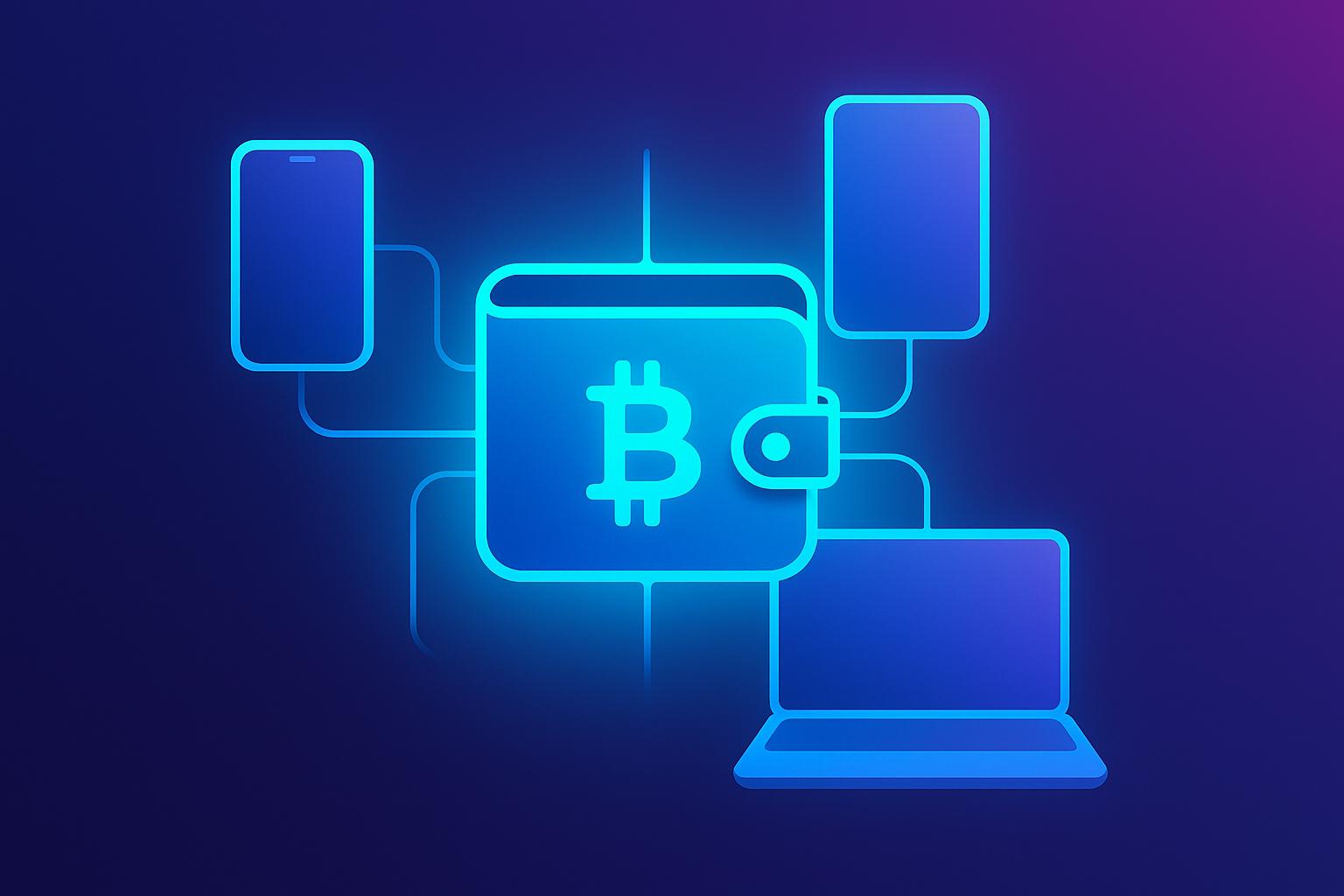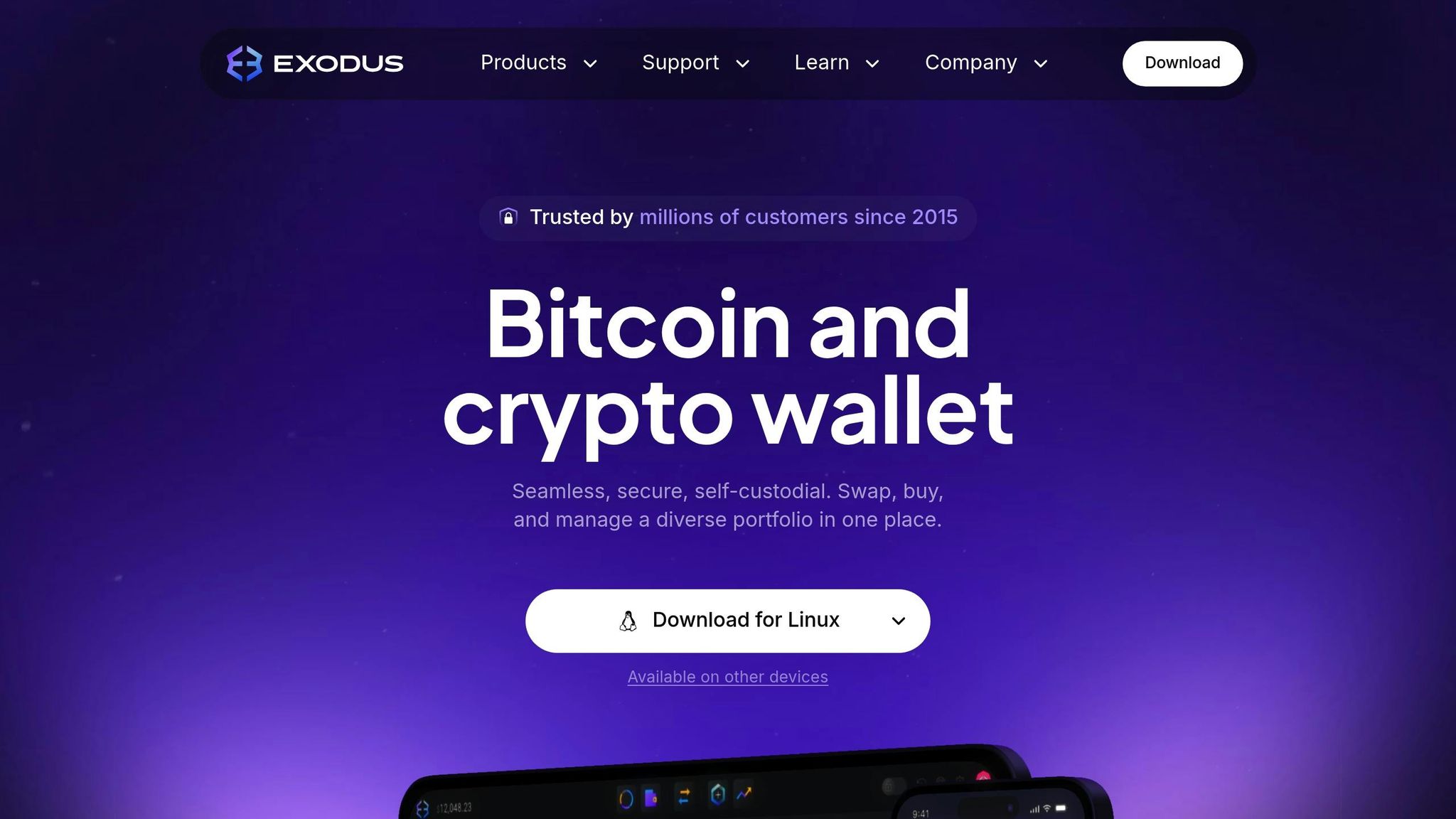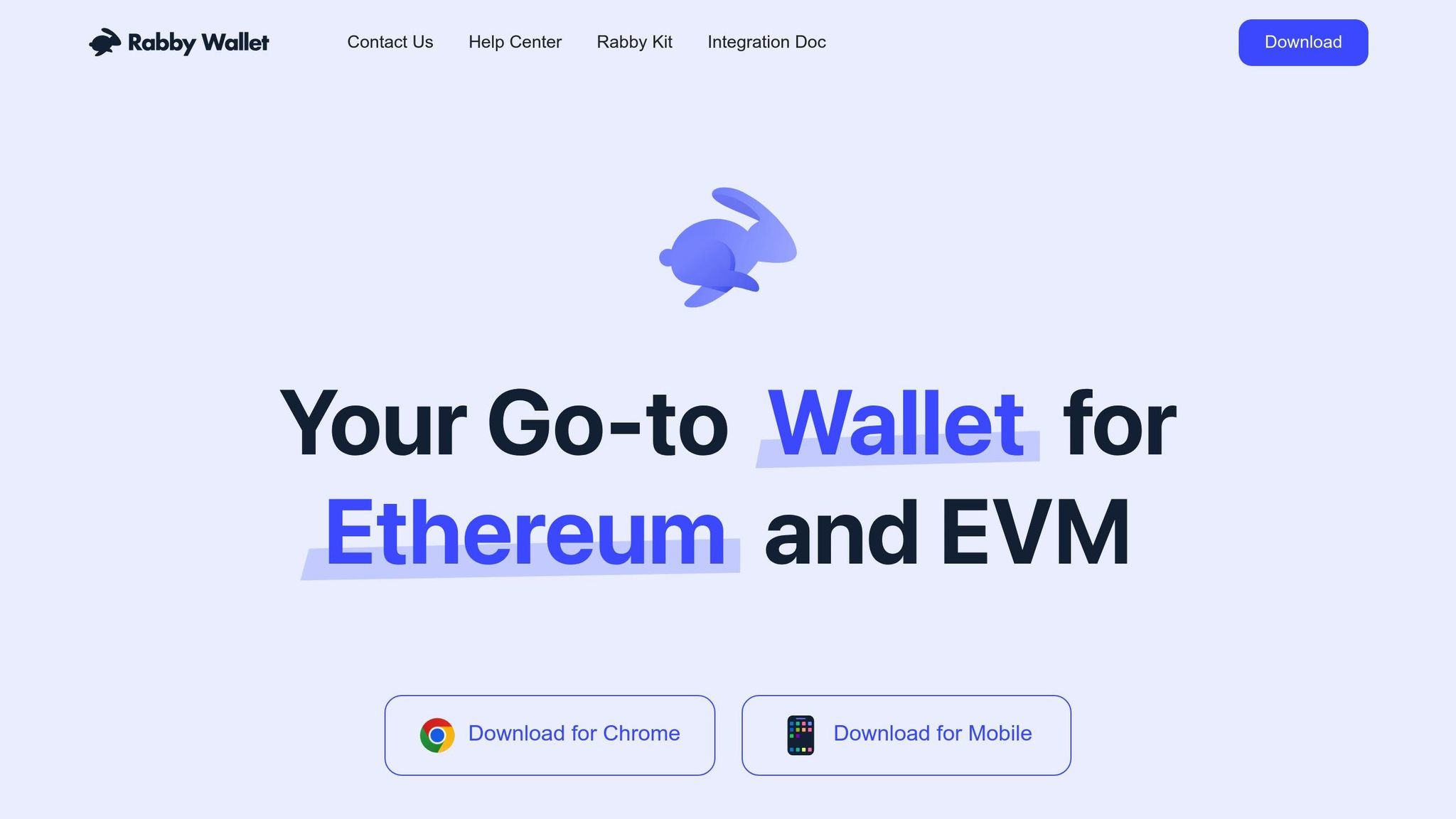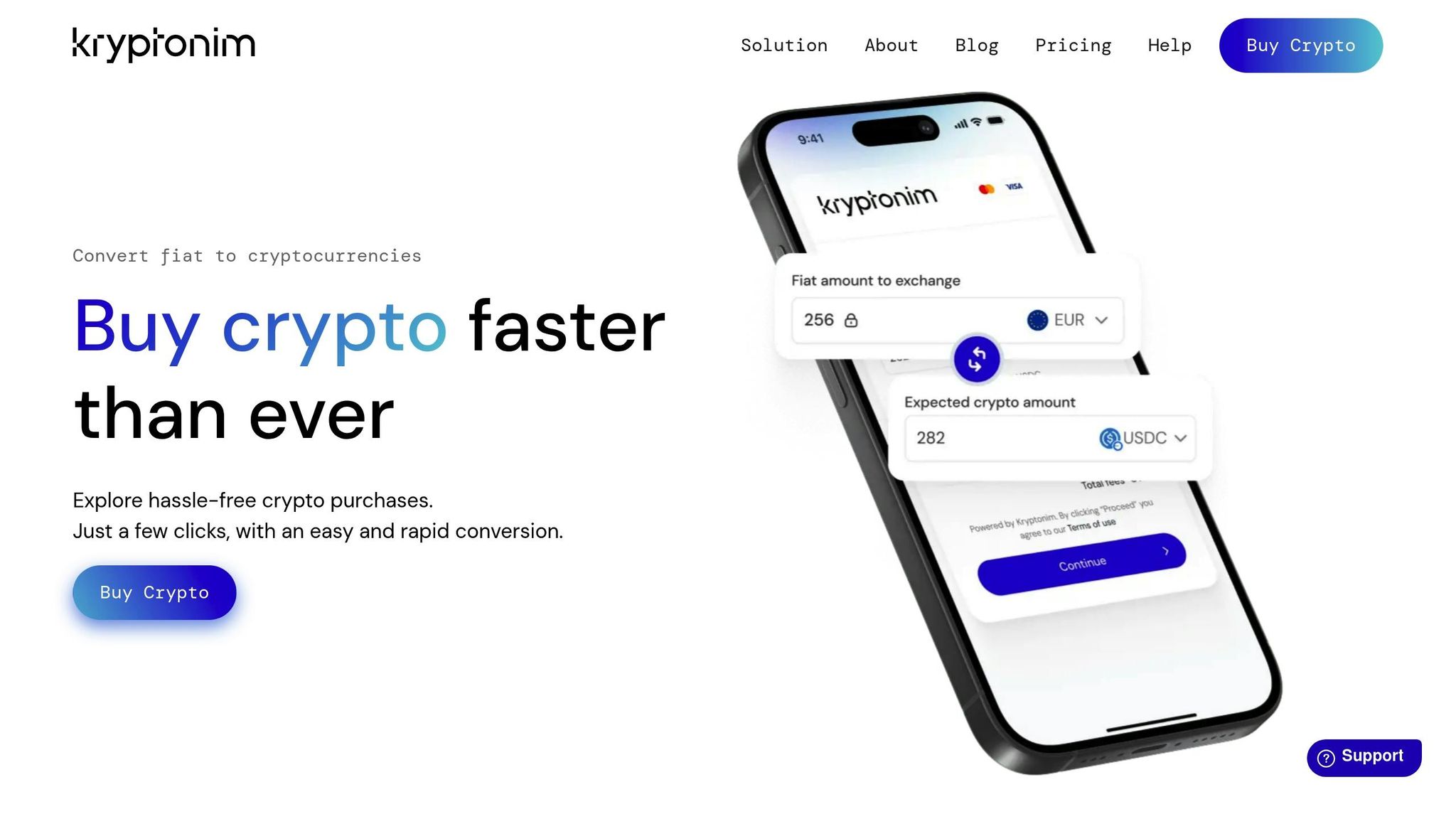Best crypto wallets with cross-platform sync
Explore the best cross-platform crypto wallets that ensure seamless synchronization across devices while prioritizing security and user experience.

Managing cryptocurrency across devices is now a must. Cross-platform wallets ensure your balances, transactions, and settings stay updated in real time, whether you're on your phone, desktop, or browser. This article highlights key features to look for - like multi-device compatibility, real-time sync, security, user experience, and multi-crypto support - and compares top wallets like Exodus and Rabby.
Key Takeaways:
- Exodus Wallet: Syncs across desktop, mobile, and browser; supports many cryptocurrencies but lacks two-factor authentication.
- Rabby Wallet: Ideal for DeFi users with multi-chain support; offers automatic network switching but has limited platform availability.
Quick Comparison:
| Wallet | Platforms Supported | Crypto Support | Key Features | Limitations |
|---|---|---|---|---|
| Exodus | Desktop, Mobile, Web | 260+ | Built-in exchange, easy sync | No 2FA, occasional bugs |
| Rabby | Desktop, Browser | 110+ chains | DeFi-focused, auto network | Limited platforms, smaller user base |
Choose a wallet that aligns with your priorities, like security, ease of use, or multi-chain compatibility. Always pair a hot wallet with a cold wallet for better protection.
What to Look for in Cross-Platform Crypto Wallets
Choosing the right cross-platform crypto wallet involves carefully evaluating key features. With the cryptocurrency wallet market expected to grow from $8.42 billion in 2023 to $61.87 billion by 2031 at a 24.8% CAGR, users have more options than ever before. But not all wallets provide the seamless experience required for managing assets across multiple devices.
"Wallet compatibility and interoperability are critical foundations of the cryptocurrency ecosystem, enabling users to manage their digital assets seamlessly across different platforms, devices, and services." - ByteFederal
Multi-Device Compatibility
A reliable cross-platform wallet should work effortlessly across all major operating systems. Whether you're using a desktop, mobile app, or web browser, the wallet should retain its core functionality and offer a consistent user experience.
For instance, Exodus Wallet takes this approach by offering native applications on multiple platforms, ensuring uniformity no matter which device you're using.
Real-Time Synchronization
Your wallet must update balances, transactions, and settings instantly across all devices. This ensures you’re never left with conflicting or outdated information when switching between platforms.
"Customers expect instant confirmations when sending or receiving cryptocurrencies." - Crypto APIs Team
Imagine sending Bitcoin from your phone - this transaction should immediately reflect on your desktop wallet or web interface, complete with an updated balance and transaction history. This is especially important for active traders who might initiate a transaction on one device and need to monitor or complete it on another.
Security Features
Security is the cornerstone of any crypto wallet. Look for wallets that offer robust encryption, secure key storage, and additional protections like biometric authentication or PIN codes.
"In 2025, crypto wallet security isn't optional - it's survival." - Zignaly
Some essential security features to prioritize include:
- Two-Factor Authentication (2FA): Use authenticator apps instead of SMS-based systems, which are vulnerable to SIM-swap attacks.
- Biometric Locks: FaceID or fingerprint authentication for mobile wallets adds an extra layer of protection.
- Address Whitelisting: Restrict withdrawals to pre-approved addresses to minimize risk.
- Regular Software Updates: Enable auto-updates to ensure you receive the latest security patches.
Consider wallets like Zengo, which use Multi-Party Computation (MPC) technology, eliminating the need for traditional seed phrases while maintaining high levels of security.
User Experience
A wallet should be easy to set up and navigate, offering a clean and intuitive interface. Whether you’re a beginner or a seasoned crypto user, the experience should feel smooth and straightforward.
Phantom Wallet, for example, is known for its user-friendly design that caters to both newcomers and experienced users alike. In 2025, Phantom Wallet expanded its functionality to include Ethereum, making it a versatile option for managing multiple blockchain networks.
Support for Multiple Cryptocurrencies
Managing diverse digital assets becomes much simpler with wallets that support a wide range of cryptocurrencies. This eliminates the hassle of juggling multiple wallets for different coins.
Look for wallets that support major cryptocurrencies like Bitcoin and Ethereum, as well as popular altcoins and tokens from various blockchain networks. Some wallets even include built-in exchange features, allowing you to swap between cryptocurrencies directly within the app. This flexibility ensures you're prepared for future additions to your portfolio.
| Security Feature | Recommended Tools | Priority Level |
|---|---|---|
| Two-Factor Authentication | Authenticator apps, YubiKey | Essential |
| Strong Passwords | 14+ characters via password manager | Essential |
| Biometric Protection | FaceID, fingerprint authentication | High |
| Address Whitelisting | Pre-approved withdrawal addresses | High |
| Regular Updates | Auto-update enabled wallets | Essential |
Next, let’s take a closer look at some of the top wallets that incorporate these features.
Best Crypto Wallets with Cross-Platform Sync
These wallets keep your crypto experience smooth by syncing across devices through blockchain updates.
Exodus Wallet

Exodus offers effortless synchronization across desktop, mobile, and browser platforms - all without needing an account. With a Google rating of 4.5/5, it supports a vast array of cryptocurrencies and even includes a built-in exchange feature.
Its user-friendly design caters to both beginners and seasoned crypto enthusiasts. For example, if you make a Bitcoin transaction on your mobile device, it instantly reflects across all your platforms. However, Exodus does have its downsides: it lacks two-factor authentication, and users have reported occasional bugs and limited customer support.
Rabby Wallet

Rabby Wallet takes things up a notch by integrating multi-chain DeFi support for a streamlined experience. Launched in 2021 by DeBank, it supports over 110 EVM-compatible networks, connects with more than 1,000 dApps, and includes 115 chain integrations. One standout feature is its automatic blockchain selection for decentralized apps, so you don’t have to worry about switching networks manually. It also previews the details of every transaction, ensuring transparency before you hit confirm.
"MetaMask is the Internet Explorer of Web3, garbage software. To say using @Rabby_io is a night and day difference would be the understatement of the century." – Zach Rynes | CLG
".@Rabby_io has pretty much become the standard browser wallet for everyone I know in the past six months. If you're not using it yet, now is a great time to check it out. I ALWAYS recommend using a hardware wallet on top of a browser wallet." – superphiz.eth
While Rabby has a slightly lower Google rating of 3.8/5, many DeFi users appreciate its fresh approach. That said, its limited availability across platforms and smaller user base can result in less responsive customer support. Even so, its network-aware sync ensures reliable access across devices.
Wallet Feature Comparison
| Wallet | Google Rating | Key Strengths | Main Limitations |
|---|---|---|---|
| Exodus | 4.5/5 | Wide cryptocurrency support, built-in exchange | No two-factor authentication; occasional bugs |
| Rabby | 3.8/5 | Multi-chain DeFi integration, automatic network switching | Limited platform availability; smaller user base |
sbb-itb-0796ce6
Wallet Feature Comparison
When it comes to managing your cryptocurrency, choosing the right wallet can make all the difference. Here's a breakdown of how some of the leading wallets stack up in terms of platform support, asset compatibility, synchronization, and security.
Platform Support
Each wallet offers different levels of compatibility across devices and operating systems. For example:
- MetaMask works on Android, iOS, Brave, Chrome, Edge, Opera, and web platforms.
- Trust Wallet is also available on Android, iOS, Brave, Chrome, Edge, and Opera.
- Ledger Live, a hardware wallet solution, supports Android, iOS, Linux, Mac, Safari, and Windows.
- Trezor Suite is compatible with Android, iOS, Linux, Mac, and Windows.
This variety ensures that users can choose a wallet that fits their preferred devices and platforms.
Cryptocurrency Support
The range of supported cryptocurrencies varies widely:
- Trust Wallet leads the pack, offering compatibility with over 4.5 million tokens.
- Guarda supports more than 400,000 assets.
- Exodus includes over 260 coins and tokens.
- Zengo handles 120+ assets, covering major networks like Ethereum, Bitcoin, BNB Chain, Polygon, Dogecoin, and Tezos.
The broader the asset support, the more versatile the wallet becomes for traders and investors managing diverse portfolios.
Sync Performance
How well a wallet synchronizes across devices is another key factor. Here's how some wallets compare:
- OKX Wallet offers smooth cross-platform syncing for mobile, desktop, and browser extensions, though it requires a stable internet connection and lacks offline functionality.
- Exodus provides reliable syncing across desktop, iOS, and Android, but it does not include two-factor authentication.
- Trust Wallet is designed with a mobile-first approach, offering an intuitive experience on smartphones, though its desktop version could use some refinement.
Real-time synchronization is essential for users who need quick access to their funds across multiple devices. For instance, Guarda offers multi-platform access but has been reported to experience occasional sync issues. Meanwhile, Ledger and Trezor provide robust syncing capabilities across their respective apps and extensions.
Feature Comparison Table
Here’s a summary of the key features for some popular wallets:
| Wallet | Platforms | Crypto Support | Sync Quality | Notable Limitations |
|---|---|---|---|---|
| MetaMask | 6 platforms | Ethereum & ERC-20 | Strong web integration | Limited to Ethereum ecosystem |
| Trust Wallet | 6 platforms | 4.5M+ tokens | Mobile-focused design | Desktop version less polished |
| Ledger Live | 6 platforms | 5,500+ coins | Hardware-centric security | Requires a physical device |
| Trezor Suite | 5 platforms | 1,800+ coins | Secure offline storage | Dependent on hardware |
| OKX Wallet | 3 platforms | - | Smooth cross-platform sync | Needs stable internet; no offline mode |
| Guarda | 3 platforms | 400,000+ assets | Multi-platform access | Reports of occasional sync issues |
Blockchain Compatibility
Blockchain support also plays a major role in wallet performance. For example:
- Rabby Wallet supports over 100 EVM-compatible blockchains, making it ideal for users who need access to multiple networks.
- Phantom Wallet, initially focused on Solana, now supports Ethereum, Bitcoin, Polygon, and other major networks.
- Coinomi offers compatibility with over 125 blockchains and thousands of tokens.
Security and Performance
Security is a top priority for crypto users. Hardware wallets like the Ledger Nano X and Trezor Model T provide excellent security by requiring a physical device for transactions. On the other hand, software wallets offer continuous synchronization and greater convenience but may not match the security level of hardware solutions.
For those actively trading, wallets like SafePal S1, which supports over 30,000 tokens across 100+ blockchains, strike a balance between broad asset coverage and operational efficiency.
Using Kryptonim for Crypto Purchases

Simplify your crypto buying experience with Kryptonim's account-free service, designed to work seamlessly with your cross-device wallet.
Kryptonim serves as a secure, EU-regulated bridge between traditional payment methods and crypto wallets. Unlike platforms that require lengthy registrations, Kryptonim lets you purchase cryptocurrency without the need to create an account. This makes it an ideal choice for both occasional buyers and regular users.
You can complete transactions using a card or local payment methods, and the crypto is sent directly to your wallet, syncing effortlessly across your devices.
"Purchasing cryptocurrencies via Kryptonim is easy and doesn't require prior experience. We made our tool so simple and intuitive that anyone can use it." - Kryptonim
Kryptonim's pricing is straightforward: EU users pay a 2% transaction fee, while users outside the EU are charged 4%. There are no hidden fees, ensuring transparency throughout the process.
For those new to cryptocurrency, Kryptonim offers educational resources and customer support to simplify the buying process. Its streamlined verification process reduces paperwork while maintaining compliance with EU regulations, letting you purchase securely with minimal effort.
Before buying, consider your risk tolerance. Kryptonim provides guidelines to encourage safe and secure practices.
Conclusion
Managing cryptocurrency across multiple devices has never been easier, thanks to cross-platform synchronization. This feature ensures that your digital assets are always within reach, no matter which device you're using. The wallets we've highlighted here each bring their own strengths to the table, but they all excel in keeping your assets synced and accessible.
When choosing the right wallet, focus on what matters most to you. If security is your top concern, look for features like multi-factor authentication and private key control. For beginners, user-friendly interfaces and clear instructions can make a big difference. More experienced users might appreciate advanced tools such as custom transaction fees or multi-signature functionality. These practices align with expert advice, emphasizing a thoughtful and balanced approach to managing your crypto.
"Treat their hot wallet like they would their actual wallet - never store more than you'd be okay losing. Think of hot wallets like your checking account - easy to use but riskier. Cold wallets are your safety deposit box - harder to access but more secure. Most investors benefit from a hybrid strategy: active funds in a hot wallet, core holdings secured offline".
For the best security, consider a hybrid strategy: keep funds for daily use in a hot wallet while safeguarding your main holdings in cold storage. This approach offers convenience without compromising on protection.
FAQs
What are the advantages of using a cross-platform cryptocurrency wallet over a single-device wallet?
Cross-platform cryptocurrency wallets allow you to access your digital assets effortlessly across different devices, whether you're using a smartphone, tablet, or desktop. This convenience lets you manage your portfolio wherever you are, without being tied to one device.
On the other hand, single-device wallets focus on simplicity and security, catering to users who prefer managing their assets on just one platform. While each type of wallet has its advantages, cross-platform wallets stand out for their ease of use and flexibility, making them a popular option for those who actively engage with cryptocurrency.
What are the security risks of not having two-factor authentication in Exodus Wallet, and how can users protect their crypto assets?
The lack of two-factor authentication (2FA) in Exodus Wallet leaves your account more vulnerable to unauthorized access. Without 2FA, your wallet's security depends entirely on your password, which could be stolen through phishing attempts or other cyberattacks.
For better protection, you might want to explore wallets that include 2FA, such as Electrum, or consider hardware wallets like Ledger or Trezor. These options offer offline storage and stronger security measures. Also, make sure to create strong, unique passwords and activate all available security settings to keep your assets as secure as possible.
Why should you use both a hot wallet and a cold wallet to protect your cryptocurrency?
Using a combination of a hot wallet and a cold wallet is a practical way to protect your cryptocurrency. A hot wallet stays connected to the internet, which makes it perfect for quick, everyday transactions. On the other hand, a cold wallet operates offline, significantly reducing the risk of hackers or malware accessing your funds.
With this setup, you can keep a smaller, easily accessible amount in your hot wallet for convenience, while storing the bulk of your assets in the more secure cold wallet. This strategy strikes a balance between security and accessibility, helping to protect your investments while still allowing for easy transactions when needed.
